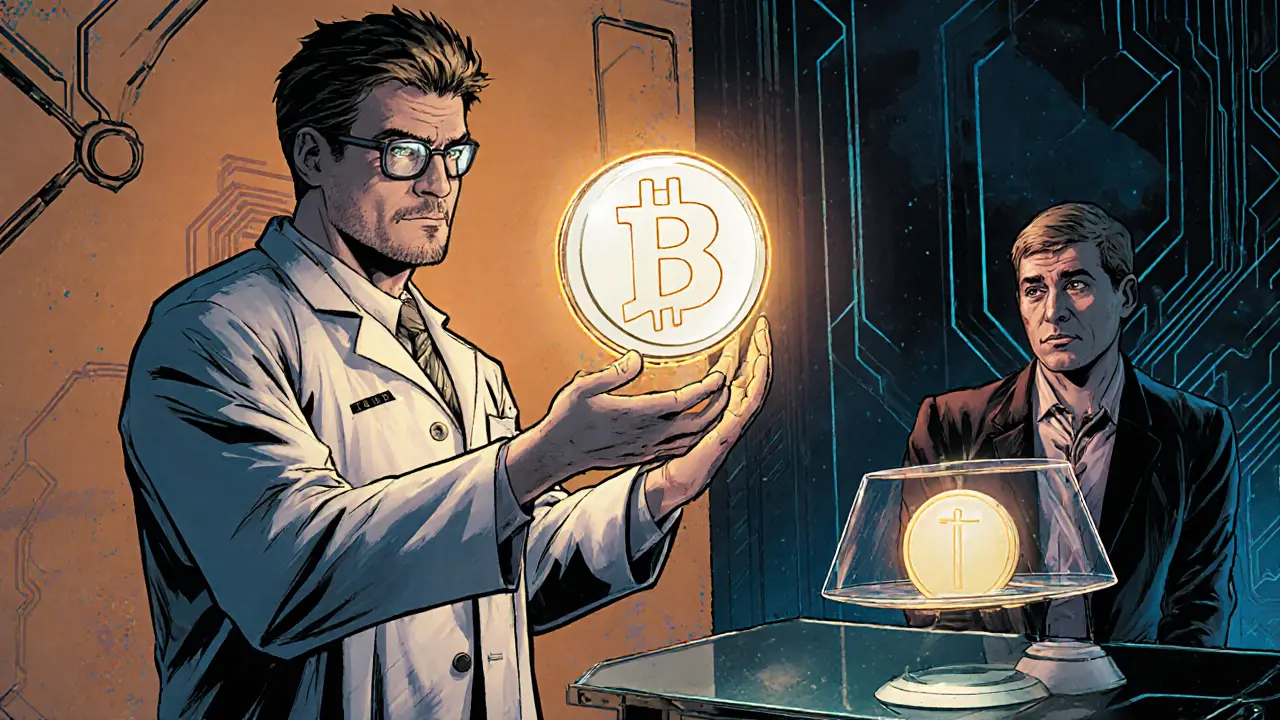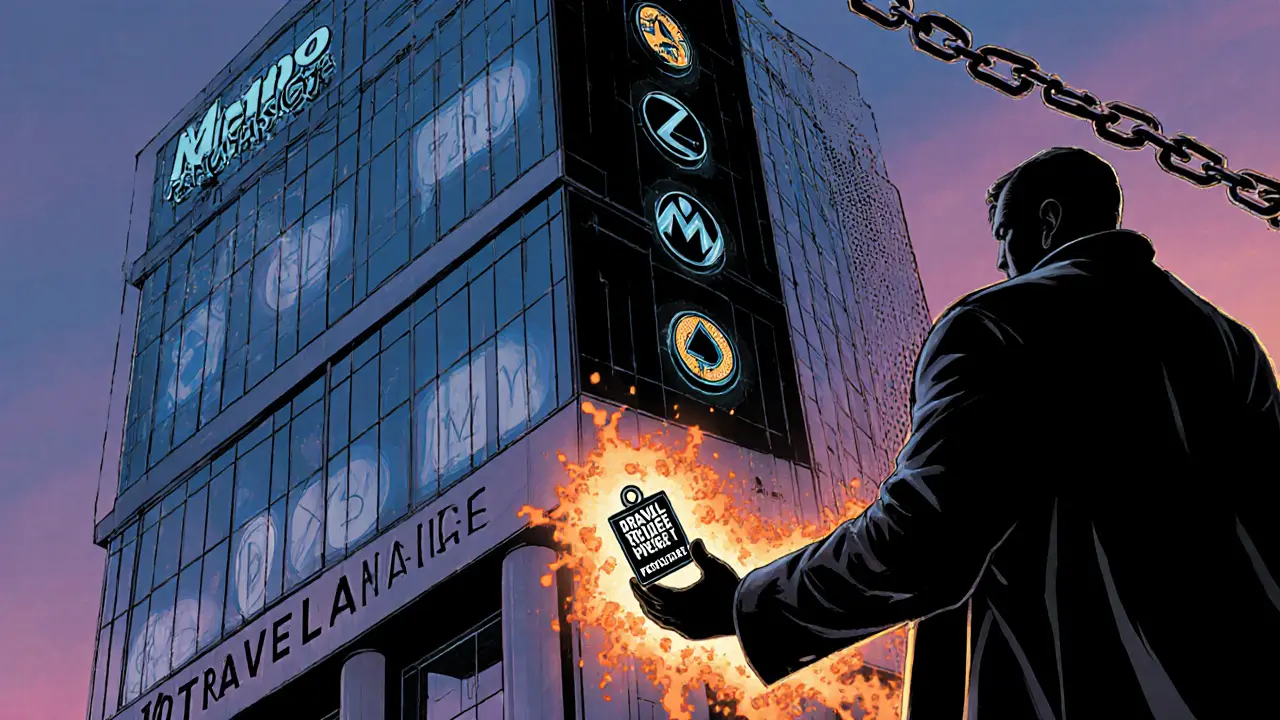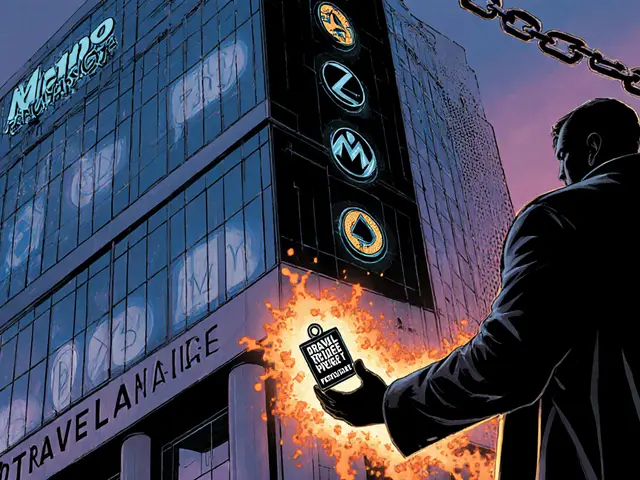Privacy Coin Delisting Tracker
2025 Delisting Stats
73 exchanges removed privacy-focused tokens in 2025
43% increase from 2023
Market Impact
71.6% price surge in 2025
$1.095 billion estimated trading volume lost
Top Privacy Coins Affected
Monero (XMR)
Ring Signatures & Stealth Addresses
Most AffectedZcash (ZEC)
Zero-Knowledge Proofs (zk-SNARKs)
High ImpactDash (DASH)
PrivateSend Mixing
Moderate ImpactMajor Exchange Delistings
| Exchange | Coins Delisted | Region | Trading Volume Impact |
|---|---|---|---|
| Binance | Monero (XMR), Zcash (ZEC), Dash (DASH) | Europe, United States | $600 million |
| Kraken | All listed privacy coins | Canada | $120 million |
| Upbit | Monero, Zcash, Dash, Haven, BitTube, PIVX | South Korea | $180 million |
| OKEx Korea | Monero, Zcash, Dash, Haven, BitTube | South Korea | $95 million |
| Poloniex | Monero (XMR) globally | Global | $45 million |
| LocalMonero (P2P) | Monero – still available | Global | +19% activity surge |
User Adaptation Strategies
Decentralized Exchanges
Trade via Uniswap v4, SushiSwap, or PancakeSwap
Peer-to-Peer Platforms
Use LocalMonero or similar services
Off-Chain Storage
Store in hardware wallets (Ledger, Trezor)
Regulatory Timeline
- June 2024: FATF extended Travel Rule to privacy coins
- July 2024: EU MiCA regulation implemented
- 2025: Over 90 countries tightened AML/CTF frameworks
Key Takeaways
- 73 exchanges removed privacy‑focused tokens in 2025, a 43% jump from 2023.
- Regulatory pressure - chiefly FATF’s Travel Rule extension and the EU’s MiCA - is the main driver.
- Monero, Zcash, Dash, Haven, BitTube and PIVX account for over 11% of global crypto transaction volume.
- Despite delistings, privacy‑coin prices surged 71.6% in 2025, fueled by limited supply on major platforms.
- Users are migrating to DEXs, peer‑to‑peer services like LocalMonero, and upcoming hybrid‑privacy solutions.
What Exactly Is a Privacy Coin?
Privacy coin is a type of cryptocurrency designed to hide transaction details such as sender, receiver and amount. Unlike Bitcoin or Ethereum, which publish every address and value on a public ledger, privacy coins employ cryptographic tricks to make tracing practically impossible.
Three technical families dominate the space:
- Monero (XMR) uses ring signatures and stealth addresses to blend each transaction with dozens of others.
- Zcash (ZEC) relies on zero‑knowledge proofs (zk‑SNARKs) that validate a transfer without revealing any data.
- Dash offers an optional PrivateSend feature that mixes coins before they are sent.
These privacy layers protect users in authoritarian regimes and shield business transactions from competitors, but they also frustrate regulators who must verify that funds are not tied to illicit activity.

Regulatory Forces Behind the Delisting Wave
The surge of exchange delistings is not random; it follows a clear regulatory timeline.
- June2024 - The Financial Action Task Force (FATF) issued new guidance extending the Travel Rule to cover 57% of privacy‑coin transactions. The rule demands that exchanges collect and share customer data for transfers above a set threshold.
- July2024 - The European Union adopted the Markets in Crypto‑Assets (MiCA) regulation, imposing strict transparency and AML obligations on all crypto services operating in the bloc.
- 2025 - More than 90 countries tightened AML/CTF frameworks, with 97 jurisdictions publishing explicit bans or heavy‑handed monitoring requirements for privacy‑focused assets.
Because the core cryptography of privacy coins deliberately prevents the collection of sender‑or‑receiver data, complying with FATF’s Travel Rule becomes technically impossible without redesigning the protocols. Exchanges therefore choose to remove the tokens rather than risk fines or license revocations.
Which Exchanges Dropped Which Coins?
Below is a snapshot of major platforms and the privacy assets they pulled in 2025.
| Exchange | Coins Delisted | Region Affected | Estimated 2025 Trading Volume Impact (USD) |
|---|---|---|---|
| Binance | Monero (XMR), Zcash (ZEC), Dash (DASH) | Europe, United States | $600million |
| Kraken | All listed privacy coins | Canada | $120million |
| Upbit | Monero, Zcash, Dash, Haven, BitTube, PIVX | South Korea | $180million |
| OKEx Korea | Monero, Zcash, Dash, Haven, BitTube | South Korea | $95million |
| Poloniex | Monero (XMR) globally | Global | $45million |
| LocalMonero (P2P platform) | Monero - still available | Global | +19% activity surge |
Notice that while centralized exchanges are pulling the plug, peer‑to‑peer services and a handful of Swiss or Liechtenstein platforms continue offering limited trading under strict KYC/AML regimes.
Market Impact: Prices, Volume, and User Behaviour
Even as exchanges stripped privacy coins from their order books, the sector posted a 71.6% price increase in 2025. The paradox is explained by three forces:
- Supply shock: With fewer listings, on‑exchange liquidity shrank, pushing prices up on the remaining venues.
- Institutional curiosity: Asset‑management firms see value in the anonymity layer for confidential intra‑firm transfers, prompting private purchases.
- Community resilience: Reddit and Telegram groups rallied around DEXs and atomic swaps, keeping demand alive.
However, Zcash reported an 8% dip in shielded addresses, reflecting that strict KYC enforcement can still deter usage. Overall transaction volume migrated toward decentralized platforms, with LocalMonero noting a 19% activity bump shortly after the February Binance delisting.

How Users Can Adapt: Decentralized & Peer‑to‑Peer Options
If you hold a privacy coin and your favorite exchange no longer supports it, you have three practical paths:
- Move to a reputable DEX. Uniswap v4, SushiSwap and PancakeSwap now list wrapped versions of Monero and Zcash via cross‑chain bridges. While you sacrifice native privacy on the DEX layer, you retain the underlying token’s anonymity.
- Use peer‑to‑peer marketplaces. Services such as LocalMonero let you trade directly with escrow‑backed contracts, avoiding any custodial hand.
- Store off‑chain. Hardware wallets (Ledger, Trezor) support XMR and ZEC natively. By keeping the coins in a non‑custodial wallet, you sidestep exchange restrictions altogether.
Whichever route you pick, always double‑check the KYC/AML policy of the platform. Some DEX aggregators now require identity verification for swaps exceeding $10,000 to stay compliant with FATF guidance.
Future Outlook: Balancing Privacy and Compliance
Developers aren’t standing still. Two trends are shaping the next generation of privacy coins:
- Selective disclosure protocols. New zero‑knowledge constructions (e.g., zk‑STARKs with built‑in audit trails) allow a transaction to be verified by regulators while keeping amounts hidden from the public.
- Hybrid token models. Projects are launching “privacy‑on‑demand” features where users can toggle shielded mode per transaction, satisfying both privacy lovers and compliance officers.
According to a recent survey, 74% of privacy‑coin developers cite FATF regulations as their biggest technical hurdle. If these hybrid solutions gain traction, we might see a slowdown in delistings after 2027, when the EU’s anti‑money‑laundering directive fully takes effect.
Until then, the market will likely stay split: regions like Switzerland and Liechtenstein will act as sandbox havens, while jurisdictions such as Japan, South Korea and the EU push for outright bans.
Frequently Asked Questions
Why are privacy coins being removed from so many exchanges?
Regulators, led by the FATF, now require detailed customer data for most crypto transfers. The cryptographic design of privacy coins makes that data impossible to collect, so exchanges choose delisting over risking fines.
Which privacy coins are most affected?
Monero (XMR), Zcash (ZEC), Dash (DASH), Haven (XHV), BitTube (TUBE) and PIVX (PIVX) are the primary targets, accounting for roughly 11% of global crypto transaction volume in 2025.
Can I still buy privacy coins?
Yes, but you’ll need to use decentralized exchanges, peer‑to‑peer platforms like LocalMonero, or keep them in a non‑custodial wallet. Centralized platforms in most major regions no longer offer them.
Will privacy‑coin prices keep rising?
The 2025 rally was driven by supply constraints and strong community demand. Future price moves will depend on how quickly hybrid‑privacy solutions address regulator concerns and whether new exchanges re‑list the assets.
What’s the outlook for privacy‑coin regulation?
Expect tighter rules in the EU and Asia, while Swiss and Liechtenstein sandbox programs may allow limited trading under strict KYC. Developers are racing to create privacy‑preserving yet compliant protocols, which could soften the delisting trend after 2027.



Jim Griffiths
October 6 2025If you’re holding XMR or ZEC, move them to a non‑custodial wallet now. Hardware wallets keep the privacy tech intact while avoiding exchange bans. This also sidesteps any future AML paperwork.
Matt Nguyen
October 6 2025One must recognize that the recent delistings are not mere market whims but a calculated response to regulaters' hegemony. The FATF’s extended Travel Rule renders the inherent anonymity of Monero, Zcash, and Dash fundamentally incompatible with compliance. Consequently, major exchanges are compelled to excise these assets lest they incur punitive sanctions.
John Corey Turner
October 7 2025When we examine privacy coins through a philosophical lens, we confront the tension between individual autonomy and collective oversight.
The very act of obscuring transaction data is a declaration of personal sovereignty.
Yet societies have long argued that absolute secrecy can erode trust and enable malign behavior.
Cryptographers responded by embedding mathematical proofs that hide amounts while still proving legitimacy.
These constructions are elegant, but they also challenge the social contract that obliges citizens to be accountable.
Regulators, interpreting this as a loophole, have extended the Travel Rule to pry open the veil.
By forcing exchanges to collect sender and receiver information, they aim to reassert control over the flow of value.
Exchanges, fearing punitive action, have chosen the blunt instrument of delisting.
The market reaction-the 71.6% price surge-reveals a paradox where scarcity fuels demand.
Investors are essentially betting on the resilience of a technology under siege.
Meanwhile, decentralised platforms are stepping into the breach, offering wrapped versions that sacrifice some privacy for accessibility.
This adaptation illustrates the adaptive capacity of the crypto ecosystem.
However, the migration also raises new vulnerabilities, such as reliance on bridge contracts.
In the long run, the community may co‑opt regulatory language, building selective disclosure mechanisms.
Only time will tell whether this compromise preserves the original ethos of privacy or dilutes it beyond recognition.
Ciaran Byrne
October 7 2025The community’s shift toward DEXs shows resilience; many users are already trading wrapped versions of privacy tokens.
Brooklyn O'Neill
October 7 2025Peer‑to‑peer platforms like LocalMonero keep the ecosystem alive.
Greer Pitts
October 8 2025I’ve seen a lot of folks panic when Binance pulled XMR, but the reality is you can still move your coins to a Ledger and stay private.
The key is to avoid custodial services that now demand KYC for swaps over $10k.
Once you’re in control of the private key, regulators can’t trace your transactions.
Lurline Wiese
October 8 2025Oh wow, look at the drama! Exchanges are scrambling like cats in a bathtub when privacy coins get the boot.
Jenise Williams-Green
October 9 2025It’s a moral failing when institutions prioritize profit over privacy rights. The delistings betray the very users they claim to protect. Regulators should focus on illegal activity, not outlaw a technology that safeguards personal freedom. Until then, we’ll keep fighting the good fight.
Laurie Kathiari
October 9 2025The crypto world is a circus and the clowns are the regulators. They juggle rules they don’t understand while privacy coins get trampled. Still, the community’s spirit remains unbreakable.
Taylor Gibbs
October 9 2025Got my XMR onto a Trezor yesterday, feels good to have full control. No more worries about exchange shut‑downs.
Rob Watts
October 9 2025Move to a DEX now.
Supply shock will push prices higher.
Bhagwat Sen
October 10 2025Interesting move, but remember bridges can be points of failure.
Always double‑check the contract address before you swap.
A single typo can cost you everything.
Cathy Ruff
October 10 2025Regulators think they’re superheroes but they’re just bureaucrats.
Their overreach will only push innovation underground.
Amy Harrison
October 10 2025Let’s stay positive! 🌟 Even if big exchanges step back, the community can adapt and thrive! 🎉
Miranda Co
October 10 2025The price surge is just a bubble waiting to burst. When the hype fades, we’ll see real usage. Until then, get ready for volatility. Investors should be cautious.
mukesh chy
October 11 2025Sure, just hop onto a P2P site and hope you don’t get scammed. The reality is these markets are a wild west with little protection. You’ll need to trust strangers with your money. Good luck navigating that chaos. It’s not as simple as you think.
Marc Addington
October 11 2025America should protect its crypto freedom!
Amal Al.
October 11 2025Absolutely, DEXs offer anonymity but also come with risks.
Make sure you understand impermanent loss and slippage before jumping in.
Using reputable aggregators can mitigate some of those concerns.
Alex Gatti
October 11 2025Developers will likely focus on selective disclosure protocols to satisfy regulators while keeping core privacy intact.
Katherine Sparks
October 11 2025The regulatory landscape is evolving, and stakeholders must adapt promptly. 😊 Please note that the adpotion of hybrid models will likely increase.
Kimberly Kempken
October 12 2025All this hype about privacy coins is just a marketing stunt. The market will correct itself once the real value is exposed. Don’t be fooled by community fanboys. Real investors know better.